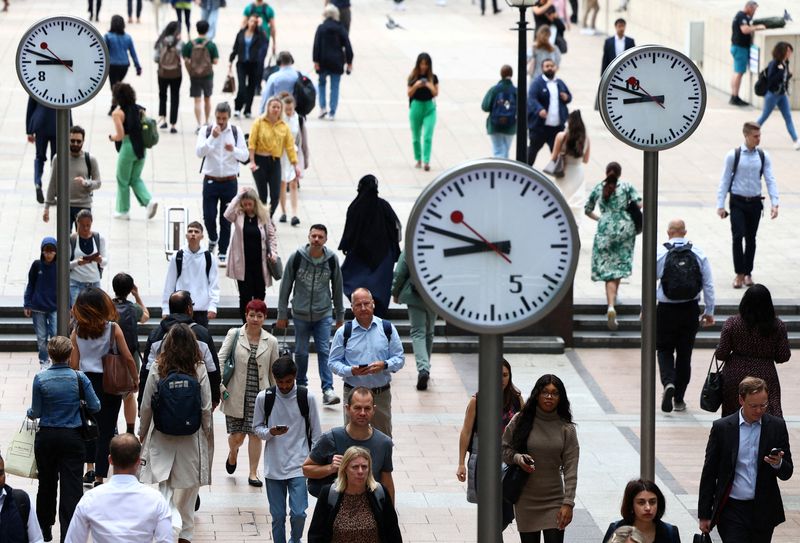Select Language

By Andy Bruce and David Milliken
LONDON (Reuters) -Britain's labour market showed more signs of cooling in the three months through July, even as data showing another month of strong pay growth left the Bank of England (BoE) on track for a further interest rate hike next month.
The unemployment rate rose, the number of people in work fell sharply and vacancies dipped below 1 million for the first time in two years, the Office for National Statistics (ONS) said on Tuesday.
It was another record month for pay growth, however - which most investors think will prompt the BoE to raise interest rates again on Sept. 22 to 5.5% from 5.25%, perhaps for the last time in the current cycle.
"The bigger question is about the path thereafter," said Hugh Gimber, global market strategist at J.P. Morgan Asset Management.
"The Bank will be reluctant to keep tightening if they've watched other central banks around the world hit pause. Yet if incoming data doesn't turn definitively, another hike to a terminal rate of 5.75% is absolutely on the table."
Last week BoE Governor Andrew Bailey said the central bank is "much nearer" to ending its run of rate increases but borrowing costs might still have further to rise because of stubborn inflation pressures.
The unemployment rate rose to 4.3% in the three months to July from 4.2% a month earlier, its highest since the three months to the end of September 2021, the ONS said.
The jobless rate is already higher than the 4.1% the BoE had pencilled in for the third quarter as a whole, when it published its last set of forecasts in early August.
Employment dropped by a greater-than-expected 207,000 in the three months to July, the biggest such fall since the three months to October 2020, the data showed.
Wages continued to rise quickly, and above the rate of inflation. Pay packets excluding bonuses were 7.8% higher than a year earlier - the joint-fastest rate since ONS records began in 2001 and in line with economists' forecasts in a Reuters poll.
Including bonuses, pay rose by 8.5% compared with the 8.2% consensus, boosted in part by backdated pay for healthcare workers. Adjusting for consumer price inflation it grew 0.6% - the first positive number since March 2022.
While good news for workers, the level of pay in real terms remains no better than it was more than 15 years ago - a historically dismal record.
"Wage growth remains high, partly reflecting one-off payments to public sector workers, but for real wages to grow sustainably we must stick to our plan to halve inflation," finance minister Jeremy Hunt said.
The pound showed little reaction to the data.

